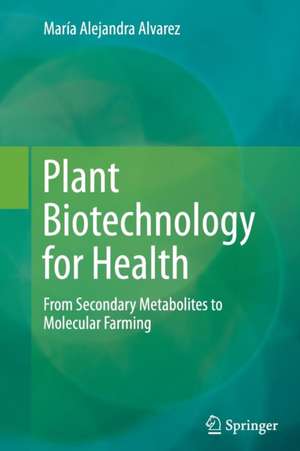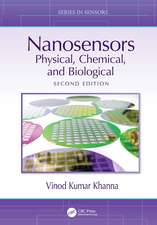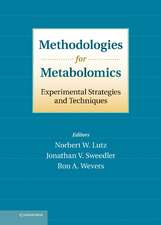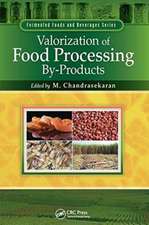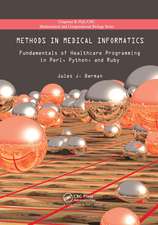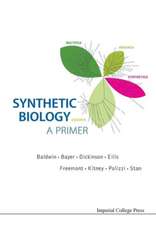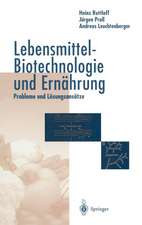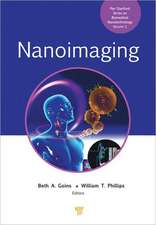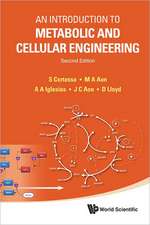Plant Biotechnology for Health: From Secondary Metabolites to Molecular Farming
Autor Maria Alejandra Alvarezen Limba Engleză Paperback – 23 aug 2016
Preț: 635.01 lei
Preț vechi: 747.06 lei
-15% Nou
Puncte Express: 953
Preț estimativ în valută:
121.51€ • 127.21$ • 100.54£
121.51€ • 127.21$ • 100.54£
Carte tipărită la comandă
Livrare economică 05-19 aprilie
Preluare comenzi: 021 569.72.76
Specificații
ISBN-13: 9783319358130
ISBN-10: 3319358138
Pagini: 179
Ilustrații: XVIII, 161 p. 41 illus., 19 illus. in color.
Dimensiuni: 155 x 235 x 10 mm
Greutate: 0.27 kg
Ediția:Softcover reprint of the original 1st ed. 2014
Editura: Springer International Publishing
Colecția Springer
Locul publicării:Cham, Switzerland
ISBN-10: 3319358138
Pagini: 179
Ilustrații: XVIII, 161 p. 41 illus., 19 illus. in color.
Dimensiuni: 155 x 235 x 10 mm
Greutate: 0.27 kg
Ediția:Softcover reprint of the original 1st ed. 2014
Editura: Springer International Publishing
Colecția Springer
Locul publicării:Cham, Switzerland
Cuprins
Plants for Health: from secondary metabolites to molecular farming .- Plants for Health.- Plant Secondary Metabolism.- In Vitro Plant Cultures as Biofactories.- Solasodine production in Solanum eleagnifolium in vitro cultures.- Molecular Farming in Plants.- The Antibody 14D9 as an Experimental Model for Molecular Farming.- Expression of the Potentially Immunogenic Truncated Glycoprotein E2 (from Viral Bovine Diarrhoea Virus) in Nicotiana Tabacum.- Mathematical Modelling in Recombinant Plant Systems: The Challenge to Produce Heterologous Proteins under GLP/GMP.
Notă biografică
Dr María Alejandra Alvarez completed her studies at the Universidad de Buenos Aires, Argentina. She graduated in Biochemistry in 1981, and Pharmacy in 1995, obtained a MS on Industrial Microbiology and Biotechnology in 1986 and a PhD on Plant Biotechnology in 1994. She was lecturer in grade and post grade courses of Botany, Pharmacobotany, Biotechnology, Food Biotechnology and Galenic Pharmacy at Universidad de Buenos Aires, Universidad Nacional de La Plata and Universidad Maimónides. Dr Alvarez started working on the production of compounds of pharmaceutical interest in in vitro plant cultures in 1986, being the author of numerous scientific articles. Her research interests include chemotaxonomy, medicinal plants, production of secondary metabolites and molecular farming. Currently, she is a member of the National Council of Research and Technology (CONICET) from Argentina, Professor of Pharmacobotany and Pharmacognoscy and director of the Plant Biotechnology Group at Universidad Maimónides and Professor of Biology at Colegio Divino Corazón.
Textul de pe ultima copertă
In vitro plant cell cultures have provided a tool for studying plant metabolism and physiology and to explore productive processes of secondary metabolites.
More recently, genetic engineering has allowed the use of in vitro cultures to modulate plant biosynthetic pathways and to express heterologous proteins of biomedical relevance.
The aim of this book is to offer background information to students and researchers in the fields of Plant Biotechnology and Molecular Farming about the potential of in vitro cultures to perform phytofermentations and molecular farming. Also, the application of in vitro cultures for the production of specific secondary metabolites and recombinant proteins is reviewed.
More recently, genetic engineering has allowed the use of in vitro cultures to modulate plant biosynthetic pathways and to express heterologous proteins of biomedical relevance.
The aim of this book is to offer background information to students and researchers in the fields of Plant Biotechnology and Molecular Farming about the potential of in vitro cultures to perform phytofermentations and molecular farming. Also, the application of in vitro cultures for the production of specific secondary metabolites and recombinant proteins is reviewed.
Caracteristici
It will have chapters related to successful cases in secondary metabolites production and molecular farming using in vitro plant cell cultures It will be a review of the latest news related to Plant Biotechnology including molecular farming, secondary metabolism, mathematical modelling, etc Focus will be in the in vitro platform for their advantages related to biosafety and controlled conditions of work that overcomes the disadvantages of plant growing in the field
